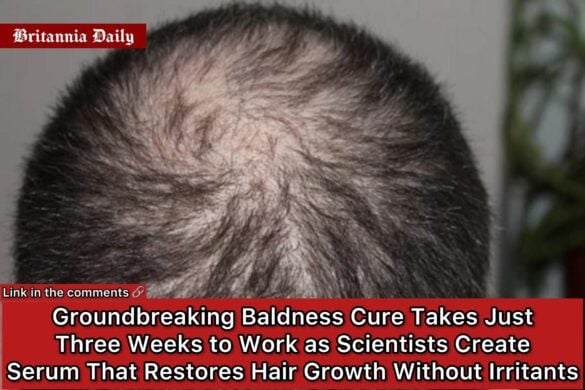A revolutionary treatment for baldness has been developed by researchers who claim it can restore hair growth in less than three weeks without causing skin irritation.
Scientists at National Taiwan University have created a cutting-edge serum that successfully restored hair growth on bald mice within just 20 days, and the treatment could soon become available as an over-the-counter product for humans struggling with hair loss.
In breakthrough laboratory experiments, the innovative potion stimulated specific fat cells beneath the skin’s surface that triggered regeneration of dormant hair follicles. The results have excited researchers who believe they may have discovered a safe, effective solution to a problem affecting millions worldwide.
Professor Sung-Jan Lin, who led the research team, revealed he tested an early version of the product on himself with remarkable results.
“I personally applied these fatty acids, dissolved in alcohol, on my thighs for three weeks and I found it promoted hair regrowth,” the scientist told New Scientist magazine.
Inspired by Natural Healing Process
The research team drew inspiration from a natural phenomenon called hypertrichosis, where excessive hair growth occurs following irritation or injury to the skin’s surface.
Although humans lost dense body hair coverage during evolution, scientific evidence suggests we retain this “important regenerative capacity” that can be activated under certain conditions.
Scientists from the Taiwanese team induced eczema on shaved mice by applying an irritant called dodecyl sulphate to their backs, then carefully observed what happened next.
Just 10 to 11 days later, areas of skin which had received the experimental serum started sprouting fresh hair from previously inactive follicles measuring just fractions of a millimetre wide.
In stark contrast, hair failed to grow on areas without the eczema induction, whilst control mice which received no treatment remained completely bald throughout the same timeframe.
How the Treatment Works
Researchers discovered this method succeeds because the irritant attracts immune cells to migrate into the layer of fat situated beneath a mouse’s skin.
This immune response signals fat cells to release fatty acids that become absorbed by hair follicle stem cells, ultimately triggering new hair growth through a sophisticated biological cascade.
“These results demonstrate that skin injury not only induces tissue inflammation but also stimulates hair regeneration,” the research team explained in their study published in Cell Metabolism journal.
Taking these findings into account, the experts then attempted to determine whether fatty acids alone could produce the same effect without requiring any chemical irritants that might cause discomfort.
Serum Works Without Irritants
The team created numerous experimental serums made from different naturally occurring fatty acids dissolved in alcohol, including oleic acid and palmitoleic acid found abundantly in both human fat tissue and plant oils.
They discovered these specially formulated potions proved remarkably effective at promoting hair growth on their own, without needing any irritating chemicals whatsoever.
“Oleic acids and palmitoleic acids are naturally derived fatty acids,” Professor Lin explained. “They are not only rich in our adipose tissues, but also in many plant oils, so they can be safely used.”
The breakthrough represents a significant advancement because existing hair loss treatments often cause skin irritation, depression, sexual dysfunction or other unpleasant side effects that discourage long-term use.
Patent and Human Trials Ahead
The researchers have secured a patent for their groundbreaking solution and now plan to test various concentrations on human scalps to establish optimal dosing protocols.
Early results appear promising, with the team observing encouraging outcomes when applying the serum to human hair follicles cultivated in laboratory conditions, as well as Professor Lin’s successful self-experimentation on his thighs.
Crucially, the scientists don’t anticipate severe adverse reactions because the active ingredients exist naturally throughout the human body and in numerous plant sources like olives.
However, the team stresses that the hair growth-promoting mechanism has not yet been scientifically validated across a diverse range of human volunteers, which represents the essential next step before commercial availability.
Natural and Safe Profile
The use of naturally derived fatty acids offers substantial advantages over synthetic chemical treatments currently dominating the hair loss market.
Because these compounds already exist in human adipose tissue and common plant oils, the treatment carries an established safety profile that should simplify regulatory approval processes.
This means the product could potentially reach consumers as a cosmetic skincare item rather than requiring lengthy clinical trials demanded for pharmaceutical medications.
“Supported by our experimental results, demonstrating hair growth activation upon topical application of monounsaturated fatty acids, their natural existence and established safety profile suggest considerable potential for treating hair loss conditions in the future,” the researchers concluded.
Addressing a Massive Problem
Hair loss affects more than half of men by age 50, creating enormous demand for effective treatments that work without causing troublesome side effects.
Current options range from medications like finasteride and minoxidil to expensive surgical procedures such as follicular transplantation, each carrying distinct limitations and potential complications.
The Taiwanese serum could provide a simpler, safer alternative if human trials replicate the impressive results achieved in laboratory mice.
Other promising treatments are simultaneously advancing through development pipelines worldwide, including stem cell therapies being researched in Madrid that could generate entirely new hair follicles by replicating younger ones.
Meanwhile, Schweitzer Biotech Company in Taiwan is developing a separate serum showing encouraging results after just two months of application.
The convergence of multiple innovative approaches suggests the next few years may finally deliver genuinely effective solutions for the millions suffering from progressive hair loss and balding.
Follow for more updates on Britannia Daily



